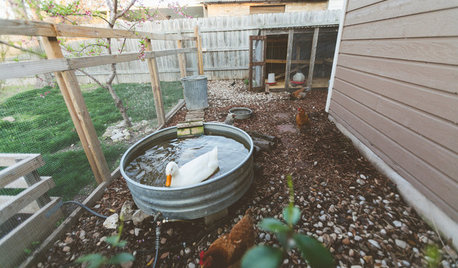goat bucks with worms
growernut
16 years ago
Related Stories

SHOP HOUZZShop Houzz: Chinese New Year
Celebrate the Year of the Goat with this auspicious collection
Full Story
KITCHEN DESIGNNew This Week: Moody Kitchens to Make You Rethink All-White
Not into the all-white fascination? Look to these kitchens for a glimpse of the dark side
Full Story
LIFEEasy Green: Modern Homesteaders Stake a Claim
With more options for raising chickens, growing edibles and keeping bees than ever, suburban and city folk are rediscovering a lost art
Full Story
GARDENING GUIDESHow to Get Your Prairie On
Have a field day with your landscape, even if you've got just a few modern containers on a paved path
Full Story
FARM YOUR YARDHouzz Call: Show Us Your One-of-a-Kind Chicken Coops
Do you have a fun or stylish backyard shelter for your feathered friends? Post your pictures and stories in the Comments!
Full Story
FARM YOUR YARDMy Houzz: An Urban Farm and Animal Sanctuary in Austin
Four dogs, four chickens, a duck and a kitten find refuge in a photographer’s updated home
Full Story
GREEN BUILDINGGoing Solar at Home: Solar Panel Basics
Save money on electricity and reduce your carbon footprint by installing photovoltaic panels. This guide will help you get started
Full Story
FARM YOUR YARDRemake Your Backyard Into a Mini Farm
You can get a taste of country life by line-drying your laundry, growing some produce or going whole hog with the critters
Full Story
SAVING WATERHouzz Call: Are You Letting Go of Your Lawn?
Many facing a drought are swapping turf for less thirsty plantings. If you’re one of them, we’d like to hear about it
Full Story






Beeone
dchall_san_antonio
Related Professionals
Waterbury Landscape Contractors · Clark Landscape Contractors · Fort Myers Landscape Contractors · Madera Landscape Contractors · Mequon Landscape Contractors · National City Landscape Contractors · The Villages Landscape Contractors · West Palm Beach Landscape Contractors · White Bear Lake Landscape Contractors · Hawaiian Gardens Landscape Contractors · Arcadia Fence Contractors · Kuna Fence Contractors · Selden Fence Contractors · Lacey Decks, Patios & Outdoor Enclosures · Meridian Decks, Patios & Outdoor Enclosuresroostersgirl
tejas_pacas
littlereo